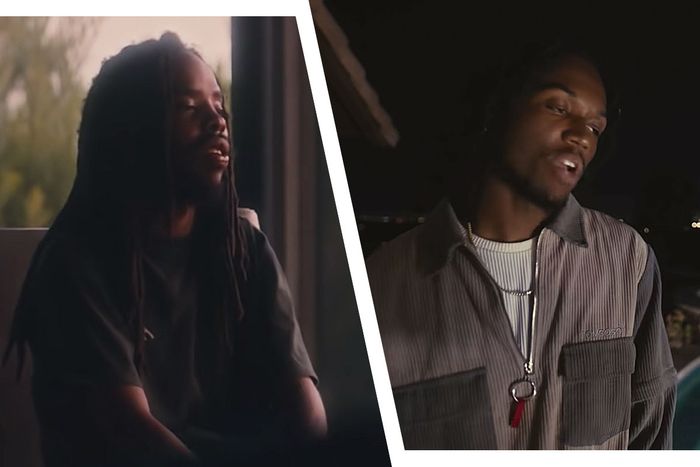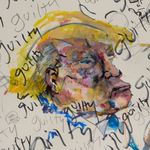
“If all of this can go bad, then what’s the point of tryin’?”
Saba wrote the song “Soldier” during a trip back home to Chicago in November 2020, reconnecting with the compatriots the rhymer and vocalist came up with over the preceding decade, where collectives like his Pivot Gang, Savemoney (Chance the Rapper, Vic Mensa), Only the Family (Lil Durk, King Von), and Glo Gang (Chief Keef, Fredo Santana) proved to the rest of the country, once again, what Windy City hip-hop was capable of. That time of year is always an emotional pressure cooker; now, especially, the holidays aren’t just times to visit family but also to stress about communicable illness, crumbling infrastructure, and frayed nerves. Few Good Things, the new Saba album home to “Soldier,” takes all these worries and more into account as it maps the unique concerns of a young Black man unnerved by his own unexpected but hard-earned success and struggling to reconcile the difficulties of his inner-city Chicago upbringing with his recent move to Southern California. A similar pall clouds SICK!, the fourth album from Earl Sweatshirt, the Cali rap scholar we first met in the gritty early Odd Future releases, whose records can sometimes feel allergic to straightforward narratives, preferring to speak in allegories that don’t easily give themselves away. Earl is spooked as well. “I fill a void with the pen, feel the fear … shrill,” he raps on “Old Friend,” SICK!’s opener. The elaborate productions and winding narratives of Few Good Things may feel several steps removed from the insular loops and bars of SICK!, but both albums poke at a similar conflict of finding comfort in acclaim and peace in a pandemic, of how to stop waiting for the other proverbial shoe to drop.
Both SICK! and Few Good Things catch their respective artists at a crossroads, coming out of a period of grief detailed across earlier projects and dedicated to brightening up the themes and textures. Saba’s acclaimed 2018 album Care for Me meditated on the murder of his cousin and Pivot Gang partner John Walt in songs like “Prom / King,” elsewhere cataloguing the brain rot that comes with too much screen time in “Logout.” That same year, Sweatshirt lost his father — African poet Keorapetse Kgositsile — and closed out his deal with Columbia Records with the autumn highlight Some Rap Songs, which he followed with the stark, moody Feet of Clay EP. Just as Saba seems to be trying to lift his own spirits using the concerted focus on silver linings, the catchy hooks, and the stylistic left turns of Few Good Things, SICK! is Earl’s way of spiffing up the architecture of his records. The new album is mixed by Young Guru, the legendary hip-hop engineer whose name gets uttered frequently in the Jay-Z catalogue. On the surface, songs like “Lye” and “2010” fit into a decades-old tradition of hypnotic indie boom-bap, but in the context of Sweatshirt’s own catalogue, as the proper follow-up to the shamanic and shambolic Some Rap Songs, it seems like he’s working less at throwing us off his trail. It’s an interest the Saba record shares: He spent much of the last album singing through the pain, mostly alone, and now he’s excitedly bouncing hooks and verses off of a dozen friends, new and old.
Few Good Things wants you to see how versatile of a performer Saba is even more than his 2016 debut album Bucket List Project did as it balanced powerful rap performances, like the Twista team-up “GPS,” and mournful melodies, like the ones in the single “MOST.” The new album proves his mettle as a rhymer able to match wits with drill artists like G Herbo and Midwest rap royalty like Bone Thugs-N-Harmony’s Krayzie Bone, and as a singer capable of gliding coolly across tracks like the deceptively vibrant “One Way or Every N***a with a Budget” or the equally bubbly and jittery single “Fearmonger.” But really, Few Good Things is telling a story of Black perseverance over time, outlining family and community histories to give extensive context to the artist’s career anxiety. Saba explains his objectives in “Stop That”: “We talking ’bout generational wealth / The pressure I built for myself / For all of the people who pics on my grandmama’s shelf / Who heard her say, “Give me the belt.” Saba’s carrying the weight of ancestral hopes and dreams. “I still get nostalgic seeing houses my family lost,” he muses in the opener, “Free Samples.” “They wished upon a star, I caught it like I’m Randy Moss.” He’s happy presently but still haunted by the past, as “Make Believe” laments: “Some people I want to be proud of me / Ain’t walking this Earth and that shatters me.” In “2012,” reminiscing on toiling away in a studio in his grandmother’s basement, where pieces of notable projects from Chicago stars Noname and Mick Jenkins (and his own debut mixtape, GETCOMFORTable) came about, Saba stresses that all this creativity was a byproduct of mortally intense concerns: “All these bodies dropping, same blocks that we played tag / For some old shit, they wanted they payback / So we escape it all in the booth with the playback / ’Cause this the only place that we knew you were safe.”
Sweatshirt revisits his own early days, and how he’s changed since, in “2010”: “Foot shook ground when I stepped on it / Didn’t look back when I broke soil / ’Cause every time I did, it would hurt more.” Earl came out in March that year. The chaotic mixtape revealed extraordinary rhyming skills and a flair for disturbing storytelling in the rapper, then 16 years old. It was ground zero for Odd Future for rap fans in the know, a few months out from the release of Tyler, the Creator’s Bastard and a key point in the yearlong hot streak that would gain an intense momentum in 2011 when Frank Ocean’s Nostalgia, Ultra mixtape took off. Earl was away at Coral Reef Academy, a Samoan retreat for at-risk boys, in those days, though, and when the fans learned of his whereabouts, some directed hostility at his mother, UCLA law professor Cheryl Harris, who was perceived as having kept her son away from a lucrative career in rap music. If it seems like Earl Sweatshirt is playing hard to get now, it’s likely a response to how fiercely we gave chase in those years. It’s also because he hates repeating himself: He scrapped a 19-song album to get to the ten-song SICK! Trying out different flows in songs like “Vision” and the title track, Earl seems in conversation with modern rap, where before, you could argue he was tired of this world and hard at work on creating one of his own. (Some people think this makes SICK! better overall than Some Rap Songs, as if a hip-hop album must be judged strictly on a rapper’s adherence to slick, neat timing. Straying from it, whether intentionally or as a result of a lack of time on the job, draws smoke. There are a million ways to approach a beat. Grow up.)
Now, each 27 years old and balancing optimism about their acclaimed careers against everything that’s at stake for them if they ever fail, Saba and Earl Sweatshirt magnify the pressures young Black men face as they speak to a sense of obligation to assist people in communities the government hasn’t given a damn about. “Every n- - - - with a budget taking care of at least ten buddies,” the chorus of “One Way” from Few Good Things explains. SICK!’s “2010” commiserates: “I’ma need a bigger bag for the cohort / Trying to make a millionaire out of slum dogs.” As the Saba album breathes a nervous sigh of relief about living in safer and more stable circumstances now, thanks to music, Earl’s album wonders how everyone else is supposed to get by this year. “Vision” shoots a dart at legislators neglecting their duties to communities in need: “How long you waiving the rent? / Moratorium extendo, I’m just evading the pit.” This is all shit you shouldn’t have to worry about in your 20s, a time for sloppily discovering your strengths and weaknesses, not stressing about how to lift your whole generation up to heights the last ones never believed possible.
The wisdom in the bars on these albums comes at the cost of a certain peace of mind. These artists have never made carefree music. How could they? There’s too many struggling, too much pain. You can’t save everyone. Saba might’ve finally amassed the “Rap Dollar$” he was after back on GETCOMFORTable, but the underlying message of Few Good Things seems to be that comfort is a lofty goal, and the best we can hope for is enough distance between our lowest points and our present to be able to marvel at how far we got. Earl just wants to walk his own path, but this is no easy task, as “God Laughs” implies: “In the middle of the marsh where mosquitoes chomp ankles / Swamp marching on, on the quest for my lost halo.” Will we ever see a future where young Black boys can shoulder less weight that isn’t theirs — or none? That’s probably the sliver of possibility, the coin toss, that keeps guys like Earl and Saba chipping at this shit while they still can.





